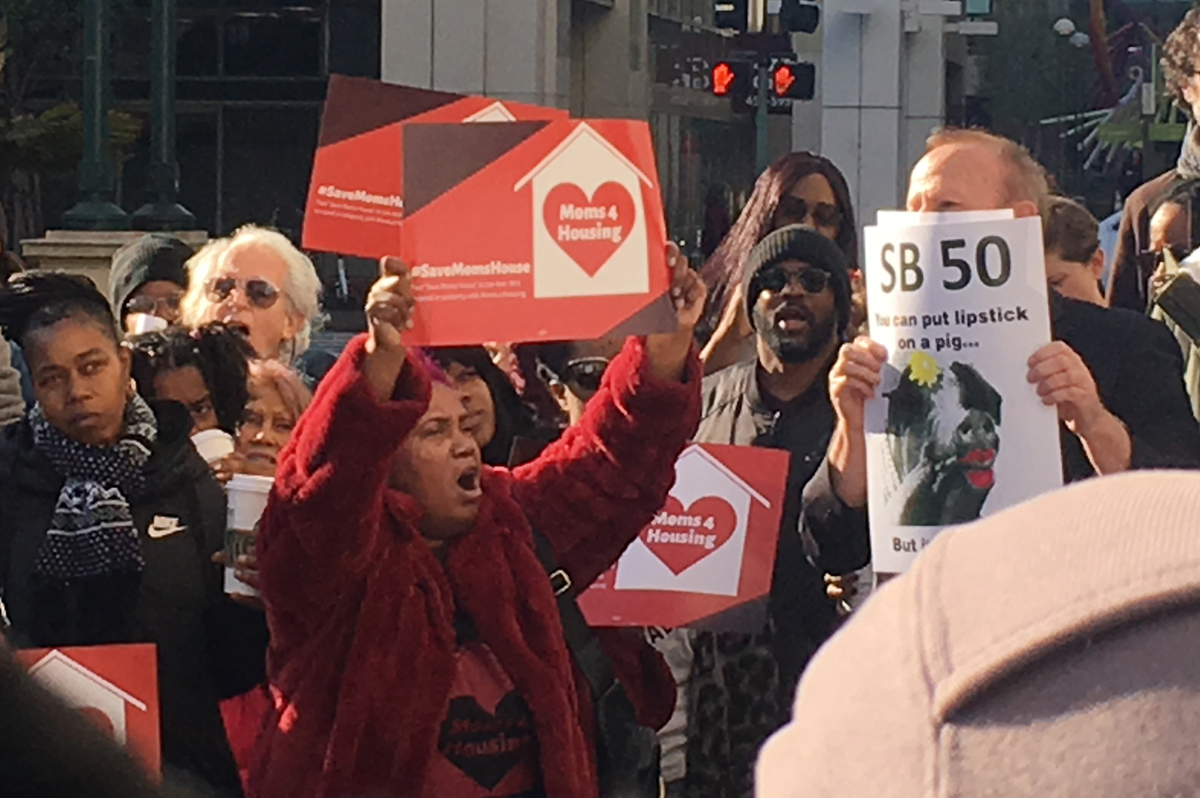
San Francisco
Sen. Wiener’s SB 50 is Back; Will Strip Zoning and Land-Use Requirements From Any Type of Housing
The bad housing bill that would not die
By Katy Grimes, June 22, 2019 9:29 am
Unable to accept the killing of his controversial housing/zoning bill SB 50, Senator Scott Wiener (D-San Francisco) has found the backdoor answer to reviving it: Wiener has replaced the language in two other bills with most of his SB 50 via the gut and amend process.
Sen. Wiener, who sees all policy through the lenses of the city of San Francisco, is attempting to foist dense San Francisco housing on the entire state, however, even San Francisco supervisors opposed his housing bill.
SB 50 would have required local governments to provide a specified “equitable communities incentive” to developers that construct residential developments in “jobs-rich” and “transit-rich” areas, which may include certain exceptions to specified requirements for zoning, density, parking, height restrictions, and floor area ratios, according to bill analysis. It was no secret that there were significant disputes over SB 50 among Democrats over housing affordability solutions. Democrats who hail from middle class and affluent cities were under pressure to oppose the bill which many believe would have greatly changed residential neighborhoods from single-family homes to adding many apartment buildings, and low-income housing.
This “gut and amend” processes is sneaky and devious, but not illegal. Given that the Legislature writes the laws, it’s also self-serving.
Bills brought back to life via the gut and amend process never have public scrutiny or go the deliberative committee process.
SB 592, the new bill called the Housing Accountability Act, takes the local control of planning and zoning from cities in the name of supply-side economics, according to Hydee Feldstein, a retired attorney in Los Angeles, active on land-use issues. SB 330 and AB 1487 are the other two bills in this gut and amend scheme.
In a nutshell, SB 592 will allow the stripping of nearly all zoning and land-use requirements from any type of housing, the removal of measures targeting housing affordability, and the inability to regulate disruptive business models such as short-term rentals, communal living, or corporate housing.
Feldstein explains:
In 2017, the California Legislature passed a comprehensive package of 15 housing bills that became effective January 1, 2018. While not perfect from anyone’s perspective, that package balanced the different policies and alternatives and was determined to be the best way forward to create affordable housing and address the housing needs in our state.
Not even one construction cycle has elapsed since those bills came into effect, yet industry has already come back—through their lobby and certain legislators—to try to undo all that was accomplished in 2017. The 2019 legislative package is an effort to roll back the requirements for inclusionary affordable housing (by way of retroactive application in SB 330 and other bills) and to trample all over local control, safety, habitat, conservation, historic preservation, and other elements of good planning that were taken into account, though weakened, in the 2017 compromise legislation.
Previously in CityWatch LA, Feldstein said she had identified SB 592 as a prime target for a “gut and amend” to try to pass SB 50 provisions this year, partly because SB 592 had successfully passed the Senate Appropriations Committee (where SB 50 had been suspended). “On June 13, 2019, that is exactly what Senator Wiener did. He gutted and amended SB 592 to transform it into a ‘housing accountability act.'”
Bill analysis for SB 592 is still for the previous iteration of the bill – about the Board of Barbering and Cosmetology.
California Globe previously reported: “Sen. Anthony Portantino (D-La Canada Flintridge), chairman of the Senate Appropriations Committee, said he was against SB 50 because it would have trumped zoning rules that are almost exclusively under the control of cities and counties, the Los Angeles Times reported. Portantino announced that the bill had been shelved until 2020 at the beginning of the committee’s hearing Thursday morning. Portantino said in an interview that he was especially concerned by provisions in the bill that would have increased density around busy bus routes, saying doing so would be out of scale with existing communities. ‘A lot of them go through ‘residential neighborhoods.’”
Feldstein says the 2019 legislative package is an effort to roll back the requirements for inclusionary affordable housing (by way of retroactive application in SB 330 and other bills) and to trample all over local control, safety, habitat, conservation, historic preservation, and other elements of good planning that were taken into account, though weakened, in the 2017 compromise legislation.
“It accomplishes the parcel zoning and relief from density as proposed in SB 50, but in an even more underhanded manner,” Feldstein said.
Feldstein explains the new bills:
- SB 592, like SB 330, defines “housing development project” to include “mixed-use developments consisting of residential and nonresidential uses” and “transitional housing or supportive housing,” all without any reference to underlying zoning or use restrictions.
- coupled with the revised definition of “housing development project,” validates the co-housing, communal living, corporate housing, extended stay, and private clubs cropping up in residential neighborhoods where zoning otherwise would prohibit such arrangements. These are not residential uses consistent with neighborhood zoning, but rather businesses that chop up interior space to maximize beds and provide shared kitchen, bath, and common living areas, renting out each bed in a shared space and often filling empty beds on a short-term basis with business travelers and tourists. SB 592 makes it impossible for a city or county to regulate these arrangements, no matter how much they may disrupt current zoning, require additional services, burden infrastructure, or disrupt neighborhoods.
Feldstein says all of the following is gone under SB 592:
- Residential zoning. Any “non-residential” use is permitted up to 1/3rd of the space of a project, including the running of a hotel, extended stay, corporate, boarding or rooming house, dorm or other business renting out a bed or other “residential” space.
- Low-density zoning of any kind, particularly single-family or two-family zoned residences.
- Architectural, design, historic and aesthetic standards. All areas now are open to Soviet-style grey cinderblock construction or Robert Moses-style overcrowded projects.
- All “objective” zoning criteria if a project “could be approved” on a variance or conditional use or any other discretionary request.
- Gov. Newsom’s and AG Bonta’s Affordable Housing Shakedown Scheme - April 25, 2024
- 6 California Cities Make the Least Affordable List for Home Buyers - April 24, 2024
- NEW REPORT: California Ranks Among Bottom of 50 States for Financial Transparency - April 23, 2024





Thank you Katy for covering these creepy legislators and their underhanded nonsense.
Of course Scott Wiener and the Gang have to sneak around using gut-and-amend because no one wants this! Not only did the SF Board of Supervisors vote against SB 50 (which is really saying something), but the silly progressives on the L.A. City Council did too — unanimously. And I’m sure they’re not alone. I wouldn’t be surprised if most Democrat legislators were against SB 50 too because once word of it got out I imagine they really got an earful from constituents. But apart from constituents’ outrage even the most progressive of them probably think ceding local zoning and land use control to the state is going a bit too far.
I know Scott Wiener et al like to preen about the suburbs being morally wrong and how lawns and backyards are evil and inequitable and whatever but I think this is probably more about MONEY than anything else. Piles and piles of it for everyone who is behind this stuff. Whoever Scott Wiener’s supporters are should get in his face and ask him and his cronies why they are championing the uber-wealthy when they pretend to be for “the people?”
https://www.assembly.ca.gov/assemblymembers
https://www.senate.ca.gov/senators
Californian is in a housing crisis.
SB 50 would have fixed this crisis.
It is the continuation of Stack & Pack housing for UN Agenda 21.. No more single-family homes ( Unless your rich and important ) and packing people into high-density Apartments including Section 8..
I’m betting old Nick below has nice digs far from the cities. I’d suggest a nice stack and Pack Complex right next to his home..
Sure hope if Gov. Newsom supports this he will move his family out of their villa and into a multi-family housing unit so he can be a shining example to all:
“Gavin Newsom bought Sacramento’s most expensive home in 2019”
https://www.sacbee.com/news/business/article231053328.html
Rob, we have no housing crisis….people are moving OUT of Caliiornia, not into it. This is Agenda 21
Yay!
Local cities and counties deserve to lose their local zoning and land control. They created this housing crisis and homelessness messed.
Thank you Sen. Wiener!
https://www.wordnik.com/words/shill
Yes, it makes sense to have stores on the bottom and housing on top floors, but no, stupid local governments say NO, we need single floor housing ONLY and people living in them MUST drive to a place with only stores than drive back to their neighborhood with only homes.
California needs more density and desperately needs mixed use development.
Go Senator Weiner! Entitled baby boomers have ruined this country and all their busybody regulations need to go, along with them!
John and Ken KFI-AM 640 discuss Sen Scott Wiener and the sneaky dirty gut-and-amend process.
Sounds like they’re reading The Globe.
(Begin at 52 min marker; segment lasts about 7 mins)
https://www.spreaker.com/user/kfiam640/6-24-jk-podcast#
Thank You! They have been great about using my articles.
I understand John and Ken have a million listeners a day, most of them probably stuck in their cars on the traffic-jammed Southern California freeways. So the coverage is great publicity for this particular issue and to alert people to the legislature’s underhanded and unethical gut-and-amend process too.
California is trying to remove regulations and Conservatives are crying, oh the irony. Also I hope this passes so hard, I hope California has practically zero zoning laws, zero parking minimums, and zero height maximums. My stupid local government has really strict parking requirements and crappy zoning laws that turned my city into parking and roads with a building here and there. Why does a haircut place that has five cars parked next to it during peak hours need 15 parking spots?! Oh yeah, parking minimums. Why are there ZERO shops within a walking distance of where I live? Oh yeah, zoning laws.
With SB-50 developers would have had more freedom to build what people actually want. Nobody likes looking at empty parking lots, this is why my neighboring city, which is a little bit more sensible, has areas with little parking requirements and everyone goes there. People love actually seeing trees, buildings, and have an ability to walk somewhere. I, like everyone else, wants to drive to one place and do everything there, not drive 20 minutes for groceries, drive another 20 minutes to get a haircut, and 20 more minutes to buy new cloths. All along the way see beautiful seas of parking. Smells like freedom.
I hope these pro-housing bills do go to voters, b/c they will win that way.
e.g., 64% of LA voters supported measure jjj transit oriented communities, which
is pretty much like SB 50. So, obviously, the will of the people is to
upzone around transit. So, why do NIMBYs pretend that anyone but NIMBY
homeowners are dead set against SB 50 thinking it is bad for LA???
Moreover, to show how inept cities are at producing housing, even w/ JJJ, LA
cannot get those project build b/c they need a state-level law, like SB 50,
to empower the city to implement JJJ over competing State level land uses.
LA actually wants and needs SB 50! But for the very vocal minority of
NIMBYs, LA and SF Bay Area (and rest of CA) would be making much more
affordable housing production progress.
NIMBYs also like to cite how Weiner’s home town is even against SB
50, which is not true. In fact, the is opposite is true, because in SF, a
recent poll found that 70+% of voters support SB 50. Yet, SF city
supervisors made a near unanimous resolution against SB 50 , just like LA
and long beach more recently did. More broadly in CA Bay Area, a recent
poll found that 60% of renters support SB 50 to build apartments and more
affordable housing, and 60% of homeowners (NIMBYs) are against SB 50. This
is also true in LA where 64% of LA voters supported measure jjj transit
oriented communities, which is pretty much like SB 50, and the high support
in SF. Similarly, a recent poll also found ~60 percent of Californians
support SB 50. So, we can safely say with multiple, strong lines of evidence
that at least ~60 percent of Californians favor Wiener’s SB 50. Thus, the
primary opposition is the vocal minority of NIMBY single family home owners
who have near 100% control of their city council/supervisor elected
officials because renters simply DO NOT VOTE.
So, do NIMBYs really think SF voters, LA voters, and CA voters are all
heavily pro making developers rich, or maybe we, the majority, are pro
getting more affordable apartments into (immorally) single family zoned
areas by mass transit or job centers? NIMBYs clearly are voting to enrich
their pockets and perpetuate the exclusionary/elitist stranglehold they
wrongfully got over our big urban cities, while the rest of average,
non-land rich, Californian’s got pushed out into the streets to die, into
the fire zones to die, and into life crushing commutes to kill their and
family’s quality of lives while destroying the environment w/ massive more
GHG, all to preserve the NIMBY prissy ‘neighborhood character and quality of
life”. NIMBYs are the height of selfishness and careless disregard for the
wide-scale human suffering they caused and are causing….
Support for the polls I reference above:
https://norcalpublicmedia.o… (see this great program on how CASA compact
was reached, at 5 min.)
https://sf.curbed.com/2019/…
alifornia-housing
https://www.bisnow.com/los-…
a-win-win-for-developers-and-community-88369
NIMBYs like to cite how Weiner historically got big donation from
developers, trying to imply that rich corporate executives and developers
wrote SB 50 in their favor, which is a standard NIMBY scare tactic, to
protect the high land/rent prices of the filthy rich NIMBY home owners who
immorally ban apartments and renters from their backyards. While benefiting
his developer donors arguably might have been what he was trying in his
killed SB 827, that is certainly no longer true in the twice amended SB 50,
which is now been amended to address all opposition issues, except, of
course, the obstructionist NIMBYs who profit off of and caused this housing
crisis. The current SB 50 is not clearly in anyone’s favor, except it was
recently amended to let small city NIMBYs off the hook to get broader
support.
That is, do we really believe that RE developers want 15-25% inclusionary
affordability requirements, demolition protections, banning development if
building has had any renter for past 7 years, excluding poor communities,
etc., etc., all of which SB 50 requires/provides. I mean, SB 50 even
protect the future potential of existing rental stock being removed by
stating it cannot used if there were any rentals on the property for 10
years prior to the proposed project.
It is ludicrous to think this was not a carefully negotiated approach by all
equity, business, and developer stakeholders, except of course, the filthy
land rich single family NIMBY home owners that caused this horrible
housing/homelessness humanitarian disaster in LA and SF Bay Area.
SB 50, unlike the killed SB 827, was a product of extensive negotiations by
all parties at the table. Just like the CASA compact, which rich old NIMBY
single family homeowners (who created the CA housing/homelessness crisis)
also are rabid against, but the young and renters (who are getting crushed
and spit out of CA) strongly support it.